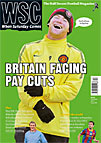 Mark Brophy questions club influence when so many players are caught bending the rules of the game
Mark Brophy questions club influence when so many players are caught bending the rules of the game
A lucky viewer watching Sky’s Goals on Sunday show a few weeks ago will have seen the star pairing, Ian Wright and Jermain Defoe, being quizzed on that weekend’s horror tackle furore. Have you, the question went, ever witnessed a manager telling his players to hurt the opposition deliberately? Jermain and Ian agreed that would never happen, though Wright then offered the caveat that no one needed to tell some of his ex-team-mates to do that – they were naturals at it.